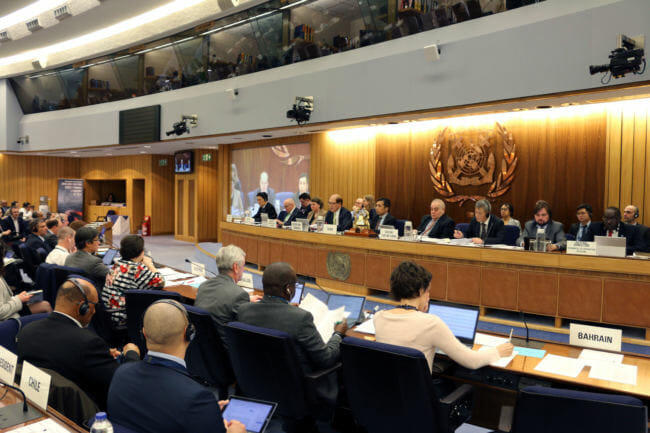
The United Nations group that regulates international shipping recently decided to move toward banning the use of heavy fuel oil in the Arctic. The thick oil presents unique challenges for cleanup in the event of a spill, especially in cold temperatures.
Environmental groups are cheering the decision, but the ban is still a ways from becoming a reality.
Heavy fuel oil, also called HFO, is relatively cheap. Which is why it’s commonly used by big commercial ships around the world, and to a lesser but still significant degree in the Arctic.
Kevin Harun is the Arctic program director for Pacific Environment, an international conservation organization. He represented the group in early April in London, at the meeting of one of the committees of the International Maritime Organization.
“It is a big deal that the IMO has been looking at a ban,” said Harun. “It’s a very cautious body and it normally does not act without strong support from countries.”
The United States was one of several countries that submitted a paper recommending the move.
Heavy fuel oil is especially viscous and could present some particular difficulties in a spill. It sinks in many cases when it’s cold, and it doesn’t disperse easily.
Austin Ahmasuk from Nome also attended the meeting. He’s a marine advocate for the Bering Strait regional nonprofit corporation Kawerak and he supports HFO being taken out of use in the Arctic.
“We want our waters as pristine as possible,” Ahmasuk said. “And a heavy fuel oil spill, or burning of heavy fuel oil… is some of the dirtiest ship power generation that exists.”
One of Ahmasuk’s big concerns is how such a spill could affect marine subsistence resources in the Bering Strait region.
Even though the regulatory group made the decision to start developing a ban, there’s still a lot that will have to happen before it’s put in place. Jeff Lantz is with the U.S. Coast Guard and was the lead representative for the US at the meeting. He says the group will have to do an assessment on the impacts of a ban.
“It would be looking at the environmental benefit but it would also be looking at the cost to shipping,” Lantz said. “It could be looking at the cost to communities in the Arctic. Would it raise the cost for delivery of goods and services to these communities?”
Once the assessment is done, the terms of the ban will have to be negotiated, including things like when it would go into effect. A final decision may still be several years out.